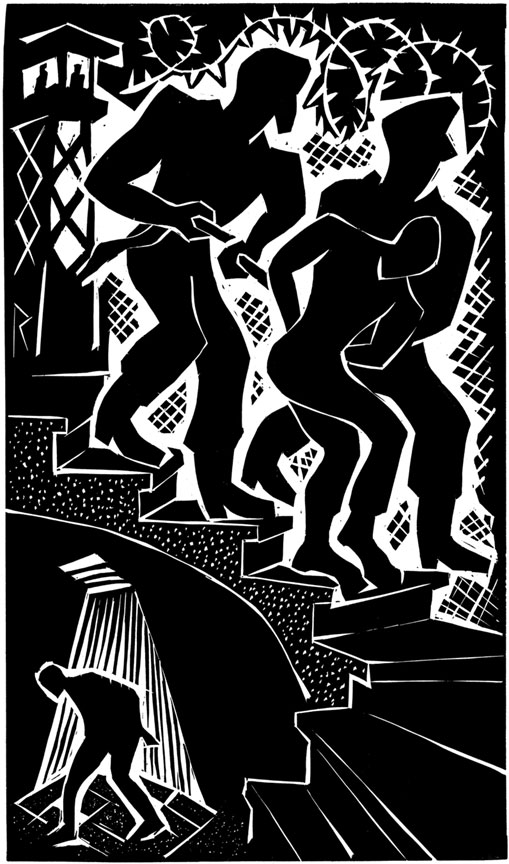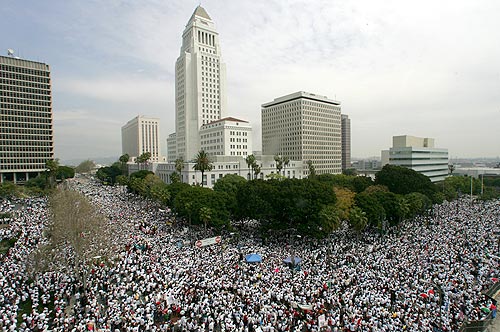|
Soc 450:
Globalization
and Social Change
Spring 2009 Instructor: Dr. Gonzalo Santos      Dr. Santos' Office: DDH-AA205 Phone: 664-2191 Office Hours: 12:20 - 1:20 pm MWF. |
|
Soc 450:
Globalization
and Social Change
Spring 2009 Instructor: Dr. Gonzalo Santos      Dr. Santos' Office: DDH-AA205 Phone: 664-2191 Office Hours: 12:20 - 1:20 pm MWF. |
Textbooks:
Course Content:
This course explores the dynamics of
global integration in the contemporary world, how it affects, and in
turn is
affected by, the world's
economic, political, and social structures, trends, and processes. We
will
explore several issues: Using the Roberts & Bellone anthology of
articles, we'll analyze historically and theoretically how constant
social change and development came to be
seen as normative aspects of the modern world, especially in the 19th
& 20th centuries; we will study the competing theories of
development -
modernization, dependency, world-systems' perspective - that arose
after World War II, in
the 2nd half of the 20th century, mirroring (and challenging) the
debates over the Cold War
bipolar world order presided by the USA and USSR; we will sutdy the
rise, apogee, and current demise of the "neoliberal" model of
globalization from the early 1980s to now. Special attention will be
given to the structural limits of late capitalism and the antisystemic
social
movements and left-of-center regimes that have risen to confront it and
seek alternative solutions. Finally, using the Bacon book, we take a
hard look at the
impact U.S.-led globalization has had on the U.S. itself and its
immediate neighbor, Mexico, from the perspective of the growing
contradition between the accelerated economic integration of North
America and the recurrent, increasingly repressive, political efforts
to curtail labor mobility within the region. The U.S.-centered Great
Financial Crash of 2008-to-? will be the 800 lb. gorilla accompanying
us
throught the quarter, as we now know that the dire predictions critics
of neoliberal globalization had been making over the last 30 years
proved to be true. Web readings will be assigned on that topic as well.
Course Structure:
The course will be run as a seminar. Students will form fourteen
groups
of three students each, and
(after the first day of class) will take turns introducing and
analyzing
the assigned
readings for
each
session, followed by class discussion. That way each student will make
two class presentations during the quarter.
Attendance is mandatory (please,
no
tardiness or early departures, as these will be penalized). All
students must come prepared to discuss the readings - either when they
make their
formal presentations,
or if they are not presenting,
by bringing to class their reading
assessments.
The reading assessments must be turned in to Dr. Santos at the
beginning
of each class session. (No late submissions will be accepted)
The students will also collaborate within their groups to produce a research project on topics related to the areas covered in the course -- each student will therefore also write a research term paper.
Class Presentations: At the beginning of the course, the students will be organized in groups of three. There will be two (first book) or three (second book) readings assigned per class. Every class, a different group will present on the assigned readings, on a rotational basis - groups can expect to present twice in the quarter. Students shall do their presentations in PowerPoint. Class discussion will follow the presentations. Please email Dr. Santos an electronic copy of your presentation. Time allotted per individual presentation will be about 10 minutes. Each presenting student will introduce, describe, highlight, and summarize his/her own portion of the assigned readings, and raise one or two key questions for subsequent discussion. As a precaution, please bring your presentations in a USB-type memory stick and also email it to your own Runner email account. When it's your turn to present, please show up early to set it up & test it. It is each group's responsibility to organize the division of labor in their presentations so there will be minimum overlap - especially when there are two readings assigned.The presentations will be graded based on: (a) the analytical
strength of the presentation, including its depth & breath (how
well it covers all the main aspects), (b) the quality of the
question(s) posed at the
end,
and (c) the quality & style of the oral presentation
(including the visuals displayed).
Reading Assessments: To
ensure that everybody come to every class prepared to discuss the
assigned
readings
for the day, students who are not
presenting must bring to class three written "reading assessments," one
for each of the
assigned readings for the day, each a page to two pages in length,
double-spaced text. No
late reading assessments will be accepted, unless the students
has a pre-authorized absence from Dr. Santos.
IMPORTANT: In contrast to the presentations, these "reading
assessments" must not
summarize or describe
the
readings,
but must critically respond
to them:
express what the you think about them; identify the
areas
of strong agreement and disagreement
with
the author, explaining why
you do,
as well as the areas or topics of most
interest
to discuss, or
anything in particular that caused you amazement, confusion, or
surprise.
Whatever you write, you should explain
your
specific
analytical (and if relevant, personal) reasons for doing so. The
reading
assessment need not
cover
every issue found in the
assigned readings for the day, but it should
demonstrate
you read everything and chose well
what to comment on (early topics are
always suspect!). A very bad assessment will
reveal the student read
very little or very
superficially just to do the assignment (it's called "going through the
motion"). A good
assessment
will demonstrate the student really read all the material and did a
serious
effort to select and critically grapple with the main issues involved.
At the end
of each reading
assessment,
students should always write their own question for class
discussion. Dr. Santos will randomly select a couple of students to
read their assessments and/or questions in the discussion periods.
Please
always write on top of your reading assessments your name, the date,
and the
reading you are assessing.
Note: Students
presenting on a given day do
not need to submit any reading assessment.
Research Papers: Each student group will collaborate in designing, researching, and writing a research volume on topics related to the main areas of the course. Each volume will contain 3 individual research papers related to different aspects of the volume's topic. The papers need to be submitted in both electronic form and printed on paper. The volume is due on Thursday, June 11, before noon, at Dr. Santos' office.
All topics - the group's general topic as well as each individual's subtopic - must be pre-approved by Dr. Santos no later than May 15.
Each printed volume should be bound and include a title page and a table of content, listing each paper by title and student author. Each individual paper should be between 6 and 8 pages long (excluding the bibliography). For a precise guide on the paper's format and citation style, go to:
http://www.csubak.edu/~gsantos/guide-paper.htmlEach individual paper should pose a central argument, or thesis, or hypothesis, and include the following sections: an introduction, stating the thesis/topic, as well as the theoretical approach and methodological framework of the paper; an analytical section on the relevant historical & contemporary processes, facts, data, related to the topic; this section should not only be descriptive, but it should include your critical analysis to explain these things, as well as other plausible alternative explanations in the literature and your critique of them; your summary and main conclusions; a bibliography; appendices (if any). The bibliography ought to reflect a good search on the World Wide Web, as well as consulted books and scholarly journals in the library. Appendices should include charts, graphs, and figures covering the pertinent topic - the better selected, relevant, and more global in nature, the better. No need for a group bibliography or consistent pagination - each papers' own will suffice.
Plagiarism: To
prevent students from wittingly or unwittingly engaging in plagiarism,
Dr. Santos strongly recommends students to carefully read and abide by
the document CSUB
Classifications of Plagiarism found at: http://www.csub.edu/tlc/options/resources/plagiarism/4plagiarimclassifications.htm.
Grading:
The final research paper is worth 35 points. Each class presentation is
worth 15 points (30 points total). The reading
assessments
all together are worth the other 35 points.
Every absence is penalized by taking one point off the
final grade
(besides the zero grade you'll get
for either failing to present or for missing a reading assessment). The
final letter grade will be
assigned, on a scale of 0
to
100, as follows:
Schedule of Reading Assignment
| Week |
Monday |
Wednesday |
Friday |
|
1
April 1, 3 |
HOLIDAY César Chávez Day |
INTRODUCTION |
GROUP
1
Roberts
& Bellone HiteArticle 1 |
|
2
April6, 8, 10 |
GROUP
2
Roberts
& Bellone HiteArticles 2 |
GROUP
3
Roberts
& Bellone HiteArticle 3 |
GROUP
4
Roberts
& Bellone HiteArticles 4 |
|
3
April13, 15, 17 |
GROUP
5
Roberts
& Bellone HiteArticle 5 |
GROUP
6
Roberts
& Bellone HiteArticle 6 |
GROUP
7
Roberts
& Bellone HiteArticle 7 |
|
4
April20, 22, 24 |
GROUP
8
Roberts
& Bellone HiteArticles 8, 9 |
GROUP
9
Roberts
& Bellone HiteArticles 10, 11 |
GROUP
10
Roberts
& Bellone HiteArticles 12, 13 |
|
5
April27, 29 May 1 |
GROUP
11
Roberts
& Bellone HiteArticles 14, 15 |
GROUP
12
Roberts
& Bellone HiteArticles 17, 18 |
GROUP
13
Roberts
& Bellone HiteArticles 19, 21 |
|
6
May4, 6, 8 |
GROUP
14
Roberts
& Bellone HiteArticles 20 |
GROUP
1
Roberts
& Bellone HiteArticles 22, 23 |
GROUP
2
Roberts
& Bellone HiteArticles 24, 25 |
|
7
May11, 13, 15 |
GROUP
3
Roberts
& Bellone HiteArticles 26, 27 |
GROUP
4
Web Readings:Wallerstein: New Revolts Against the System Perry Anderson: Jottings on the Conjuncture |
GROUP
5
Web
Readings:Robert Wade: Financial Regime Change? Peter Gowan: Crisis in the Heartland |
|
8
May18, 20, 22 |
GROUP
6
Web
Readings:Carlos Aguiar de Medeiros: Asset-Stripping the State Emir Sader: The Weakest Link? |
GROUP
7
BaconChapter 1 |
GROUP
8
BaconChapter 2 |
|
9
May25, 27, 29 |
HOLIDAY Memorial Day |
GROUP
9
BaconChapter 3 |
GROUP
10
BaconChapter 4 |
|
10
June1, 3, 5 |
GROUP
11
BaconChapter 5 |
GROUP
12
BaconChapter 6 |
GROUP
13
Bacon: Article 37Chapter 7 |
|
11
June 8 |
GROUP
14
Bacon: Article 37Chapter 8 |
Research Papers due in Dr. Santos's office before noon on Thursday, June 11 |
|
My other group members' names, phones & email addresses are:
1.
____________________________________________________________________________________
2. ____________________________________________________________________________________
Date: My own presentation will be on:
1. _________________________________________________________________
2.
_________________________________________________________________
My own research paper title:
_____________________________________________